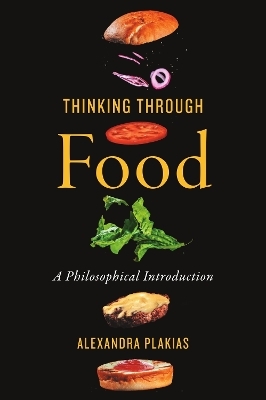
Thinking Through Food
Broadview Press Ltd (Verlag)
978-1-55481-431-2 (ISBN)
This book offers a wide-ranging yet concise introduction to the many philosophical issues surrounding food production and consumption. It begins with discussions of the metaphysics, epistemology, and aesthetics of food, then moves on to debates about the ethics of eating animals, the environmental impacts of food production, and the role of technology in our food supply, before concluding with discussions of food access, health, and justice. Throughout, the author draws on cross-disciplinary research to engage with historical debates and current events.
Alexandra Plakias is Assistant Professor of Philosophy at Hamilton College.
ACKNOWLEDGMENTSINTRODUCTION
CHAPTER ONE: THE METAPHYSICS OF FOOD
Introduction
1. What Is Food?
1.1 Food as a Natural Kind?
1.2 Food as a Functional Kind?
1.3 Food as Nutrition: Why Not Eat Pets?
1.4 Socially Constructed Kinds
1.5 Social Construction and Normativity
1.6 Social Construction and Subjectivity
2. What Is Flavor?
2.1 Flavor and Taste: Some Background
2.2 What Is Flavor? The Case of Chloe
2.3 Flavor as a Secondary Quality
Conclusion: Taste, Flavor, and Objectivity
CHAPTER TWO: THE EPISTEMOLOGY OF FOOD
Introduction
1. Epistemology and Food
2. Empiricist vs. Rationalist Approaches to Knowledge
3. Knowledge of Taste and Subjective Experience
4. Taste and Testimony
4.1 Knowledge, Justification, and Testimony
4.2 Testimony and Food
4.3 Testimony, Vulnerability, and Epistemic Justice
4.4 Testimony and Trust
5. Labels, Lies, and Bullshit
6. Knowing Food: Knowing That or Knowing How?
7. Skill, Virtue, and Food Choice
Conclusion
CHAPTER THREE: AESTHETICS
Introduction
1. Taste and Philosophy: A Tendentious Relationship?
2. The Nature of Aesthetic Experience
3. Hume and the Standard of Taste
4. Food as Aesthetic Experience
5. Defining Art
5.1 Traditional Characteristics of Art: Form, Expression, Representation
Form
Expression
Representation
5.2 Institutional/Conventional Definitions of Art
5.3 Aesthetic Definitions
6. Food as Art: Objections
7. Food: The Art and the Artwork
8. Food as Art, Recipes as Property?
9. Cuisine and Cultural Appropriation
Conclusion: Food as Art, and as Cultural Artifact
CHAPTER FOUR: THE ETHICS OF EATING ANIMALS
Introduction
1. Eating Animals: The Problem of Suffering
2. Utilitarianism
2.1 Factory Farming: Some Facts and Figures
2.2 Animal Suffering and the Causal Impotence Objection
2.3 Critiques of the Argument from Suffering: Happy Meat, Engineered Animals?
3. Deontological Objections to Eating Animals
3.1 Animal Rights
3.2 Contractarianism and the Moral Status of Animals
4. The Moral Status of Animals
4.1 Animal Equality and the Argument from Marginal Cases
4.2 Speciesism
5. Value Pluralism
6. Feminist and Care Ethics
6.1 Feminist Critiques of Traditional Discourse
6.2 Feminism and the Ethics of Care
7. Practical Implications: Ought We Eat Animals?
Conclusion
CHAPTER FIVE: AGRICULTURE AND THE ENVIRONMENT
Introduction
1. Environmental Impacts of Food Production: Some Facts and Figures
1.1 Pesticides and Pollutants
1.2 From Land to Sea
1.3 The Problem of Waste
2. Environmental Ethics: Anthropocentric vs. Ecocentric Approaches
2.1 Ecocentrism: Arguments and Interpretations
2.2 Ecocentrism and the Last Person Argument
2.3 Ecocentrism and Holistic Ethics
Deep Ecology
The Land Ethic
2.4 Ecofeminism
3. Environmental Ethics, Agricultural Ethics
3.1 Stewardship: Towards an Agricultural Ethic?
3.2 Stewardship and Future Generations
4. Environmental Ethics through Traditional Approaches
4.1 Utilitarianism and Environmental Ethics
4.2 Deontological Approaches
4.3 Virtue Ethics and Agrarian Ethics
Conclusion: Reconciling the Views—Pluralism Again?
CHAPTER SIX: FOOD AND TECHNOLOGY
Introduction
1. The Green Revolution
2. The Debate over GM Foods
3. GM Crops: Background and Uses
4. GM Crops: Objections
4.1 Extrinsic Objections to GM Foods
Objection 1: GM Is Bad for the Environment
Objection 2: GMOs Threaten Biodiversity
Objection 3: GMOs Perpetuate Social Injustice
Objection 4: Safety, Risk, and Precaution
4.2 Intrinsic Objections to GM
Objection 1: GM Food Is Unnatural
Objection 2: GM and the Yuck Factor
5. Disgust and Technology
5.1 Disgust, Rationality, and Labeling
Conclusion: An Irreconcilable Moral Disagreement?
CHAPTER SEVEN: FOOD, HEALTH, AND FREEDOM
Introduction
1. Liberty and Liberalism: The Harm Principle
1.1 Deontological and Rights-Based Defenses of Liberalism
1.2 Consequentialist Defenses of Liberalism
2. Liberty: Positive and Negative Conceptions
3. Food, Freedom, and Failures of Will
4. Paternalism: What and Why
5. Cognitive Biases, Weakness of Will, and Paternalism
5.1 Akrasia and Weakness of Will
5.2 Libertarian Paternalism and Weakness of Will
6. Food Environments and Freedom
7. Paternalism Revisited
7.1 Coercive Paternalism
7.2 Objection: Whose Values?
8. Stigmatization, Moral Panic, and the Social Policing of Bodies
9. Health and Food: Whose Responsibility?
10. Advertising, Autonomy, and Trust
Conclusion
CHAPTER EIGHT: FOOD JUSTICE
Introduction
1. Global Hunger and Malnutrition
2. The Utilitarian Argument for an Obligation to Aid
Objection 1: Demandingness
Objection 2: Unrealistic Psychological Demands?
Objection 3: A Right Not to Aid?
3. The Lifeboat Objection—An Argument against Aid
4. Food: A Basic Right?
5. Hunger: Beyond Scarcity
5.1 Sen’s Entitlements Theory
5.2 When Enough Isn’t Enough: Food Sovereignty Movements
6. Food Access, Food Production, and Distributive Justice
6.1 Distributive Food Justice
6.2 Food Justice as Social Justice: Critiques of the Distributive Paradigm
6.3 Food Justice as Participatory Justice
6.4 Food Justice and Environmental Costs
6.5 Labor and Food Justice
7. Food “Deserts” and Food Access
Conclusion
| Erscheinungsdatum | 02.03.2019 |
|---|---|
| Verlagsort | Peterborough |
| Sprache | englisch |
| Maße | 152 x 229 mm |
| Gewicht | 282 g |
| Themenwelt | Geisteswissenschaften ► Philosophie ► Allgemeines / Lexika |
| Geisteswissenschaften ► Philosophie ► Erkenntnistheorie / Wissenschaftstheorie | |
| Geisteswissenschaften ► Philosophie ► Metaphysik / Ontologie | |
| ISBN-10 | 1-55481-431-6 / 1554814316 |
| ISBN-13 | 978-1-55481-431-2 / 9781554814312 |
| Zustand | Neuware |
| Haben Sie eine Frage zum Produkt? |
aus dem Bereich


